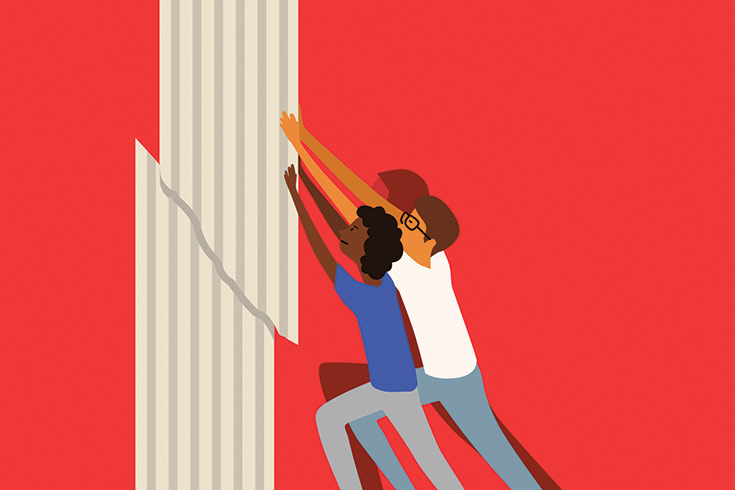A Rapidly Changing Media Landscape
By Neil Swidey

Illustration by Nick Lu
This story originally appeared in the Summer 2023 edition of Brandeis Magazine.
Part of Past as Prologue
Journalists may write the first draft of history, but they wade into prophecy at their own peril. To get a handle on what journalism may be like a quarter of a century from now, it’s helpful to look back in time.
Two decades ago, before Google went public, I logged lots of reporting hours at its headquarters, exploring the question of whether the company would transform our concept of privacy. Co-founder Sergey Brin breezily assured me everything would be fine, falling back on the information-wants-to-be-free lingua franca of Silicon Valley. (He did seem unsettled when I told him I had dug up his date of birth. That kind of info was still hard to find.) Around the same time, I hung out in MIT’s Media Lab, listening to the best and brightest foretell the coming Web 2.0.
What strikes me today is how eerily accurate these tech evangelists were in predicting the rise of social media — and how completely they missed the enormous drawbacks that accompanied this shift.
Techies need more of journalism’s hallmark skepticism, and journalists could use more of the tech world’s hard-wired optimism. After all, few journalists foresaw the resurgence of radio in the 1980s and ’90s (when NPR was a chief beneficiary of longer commute times in U.S. metro areas). Even fewer predicted the explosion of podcasting. And as recently as 2010, newsroom office pools were offering long odds that The New York Times would survive another decade, never mind emerge bigger and more profitable than ever.
In the Brandeis journalism program, which has seen a dramatic spike in interest, we’re preparing our students to adapt to the rapidly changing media landscape.
I offer up measured hopes for journalism over the next quarter century. May quality local news outlets see a radio-like resurgence, with today’s independent digital startups building into a wave of success, in communities from coast to coast. And may a critical mass of Americans finally tire of our awful Fox News-versus-MSNBC drift toward affirmation rather than information, and once again turn to national news outlets that give us all a common set of facts.
If this happens by the middle of the century, we’ll have a lot more than Brandeis’ centennial to celebrate.
Professor of the practice Neil Swidey directs the journalism program.



